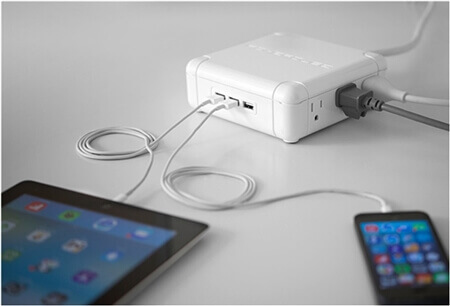 Staying connected on an RV trip doesn’t have to be a challenge. Nowadays, our mobile electronic devices are always on hand, whether we’re at home or traveling. There are GPS systems, tablets, smartphones, laptops, and other devices. These are devices that require internet access to function optimally and devices that frequently need charging. It may seem counterintuitive to have all these with you while on the road, but depending on what your needs and preferences are, you may end up taking most of them with you. If you work remotely, or simply want the added peace of mind of having a fully charged cell phone, getting optimum use out of your mobile devices is important.
Staying connected on an RV trip doesn’t have to be a challenge. Nowadays, our mobile electronic devices are always on hand, whether we’re at home or traveling. There are GPS systems, tablets, smartphones, laptops, and other devices. These are devices that require internet access to function optimally and devices that frequently need charging. It may seem counterintuitive to have all these with you while on the road, but depending on what your needs and preferences are, you may end up taking most of them with you. If you work remotely, or simply want the added peace of mind of having a fully charged cell phone, getting optimum use out of your mobile devices is important.
Making sure you have a reliable Internet connection can be a priority. One way is to use cell data, or use a nearby WiFi network. Which option you choose can depend on several factors. One factor would be to determine how much internet you think you’ll be using. If you plan to stream a lot of movies, or work while on the road, there will be a big difference in internet usage compared to simply using it to check your phone once in a while. If you feel your internet use will be extensive, an unlimited data plan with a mobile WiFi hotspot may be the best option, as campground WiFi, if it offers it, can be unreliable. Campground WiFi is also often a public network, which is not secure enough for banking or other activities that require personal information. Another thing to keep in mind is where you tend to take your RV. Are you typically in campgrounds with modern amenities or do you prefer boondocking? You may have to rely on cell data if you’re often in remote areas. Make sure you have a nationwide plan to increase your chances of getting a decent signal. You can also make use of signal boosters, like
WeBoost, which repeat a WiFi or cell signal to extend the range. For some, the most important thing to consider may be the price. Unlimited data plans can be expensive, but are often the best way to stay connected, especially if you sometimes use your phone as a WiFi hotspot. Of course, if you don't plan on needing the internet much, an unlimited data plan may not be necessary.
Unlike being at home, you may not always be near an outlet to keep your devices charged. After all, you’re an on RV trip to get outside! To avoid having a constant need to charge something, do your best to reduce usage and lengthen battery life. When it comes to your cell phone, you’ll want to conserve the battery as much as possible, as you never know when you may need it. Lowering the screen brightness, or using battery saver or airplane mode are both simple ways to preserve the battery. Try not to use your phone in particularly hot or cold areas. So keep it insulated when in cold temperatures and shaded while in warmer temperatures. Another thing to avoid is overcharging your devices. Many of us will keep devices plugged in overnight to charge, but unless it’s going to take 6-8 hours, you could be overcharging it, which will reduce the battery life. On phones and tablets, make sure you close out all your apps when you’re not using them, and stop ones that are running in the background. Disable unnecessary push notifications, or simply log out of the app when you’re not actively using it! Of course, the easiest way to preserve the batteries is to keep your mobile devices turned off until you need to use them.
Of course, you will have to charge your devices at some point, especially if you’re on a trip longer than a weekend. Portable power banks can come in handy when you’re not only away from home, but also away from your RV. Of course, once they’ve been depleted, the power banks will need recharging as well. A solar powered charger on the other hand, will always have power as long as there’s sunlight. However they may not be as effective on cloudy days.
GoalZero offers both types of chargers to keep your devices powered up. When you are back at your RV, there are options you can use besides plugging your device into an outlet. There are hand crank chargers and car chargers, as well as devices that can charge multiple items at once, such as the PowerQube. Check other electronics as well. Things like lanterns or Bluetooth speakers may feature a USB port that is able to charge a mobile device.
Staying mindful of how and when you use your mobile devices can go a long way when nearby power is scarce. Likewise, being aware of what kind of internet usage you need will help you make sure that you’ll stay connected, no matter how often you expect to use it. Being on an RV trip and away from home doesn’t mean you’ll have to give up modern connectivity, unless you want to! After all, getting away from it all and unplugging for a bit can be beneficial too.
Using Mobile Devices During an RV Trip